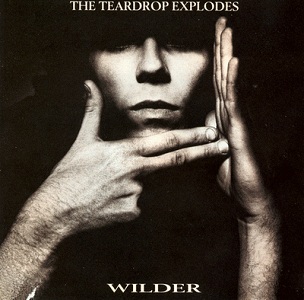Big in Japan were a punk band that emerged from Liverpool, England in the late 1970s. They are better known for the later successes of their band members than for their own music.

Julian David Cope is an English musician and author. He was the singer and songwriter in Liverpool post-punk band The Teardrop Explodes and has followed a solo career since 1983 in addition to working on musical side projects such as Queen Elizabeth, Brain Donor and Black Sheep.
The Crucial Three were a short-lived band that existed for approximately six weeks in early 1977. They are nevertheless notable on account of the individual success of all three founding members: Julian Cope formed The Teardrop Explodes and has enjoyed a long and successful solo career as an author, photographer and singer, Ian McCulloch formed the very successful Echo & the Bunnymen, while guitarist Pete Wylie formed Wah! Heat and enjoyed major chart success with "The Story of the Blues". In those early days, McCulloch sang, Cope played bass, and Wylie played guitar. A drummer, Stephen Spence, also joined at some point in their brief life.

Thingwall is a village on the Wirral Peninsula, in Merseyside, England. The village is situated approximately 8 km (5.0 mi) to the south west of Birkenhead and 3 km (1.9 mi) north east of Heswall. Historically part of Cheshire, the area is within the Pensby and Thingwall Ward of the Metropolitan Borough of Wirral and the parliamentary constituency of Wirral West.

The Teardrop Explodes were an English post-punk/neo-psychedelic band formed in Liverpool in 1978. Best known for their Top Ten UK single "Reward", the group originated as a key band in the emerging Liverpool post-punk scene of the late 1970s. The group also launched the career of group frontman Julian Cope as well as that of keyboard player and co-manager David Balfe. Other members included early Smiths producer Troy Tate.
Dalek I Love You were a synthpop group from the Wirral, England. At various points in their existence, the band was also known as Dalek I. Record executives at Phonogram shortened the band's name without telling them for the "Freedom Fighters" single.

Compass Kumpas was the first album from Dalek I Love You, shortened to Dalek I for this album and accompanying singles. It was released on May 24, 1980, by Back Door/Phonogram records.
David Balfe is a musician and record company executive, most notable for playing keyboards with the Teardrop Explodes, founding the Zoo and Food independent record labels, signing Blur and for being the subject of their first number one hit, "Country House".

Kilimanjaro is the debut album by the neo-psychedelic Liverpool band The Teardrop Explodes, released on 10 October 1980. It contains versions of the band's early singles – "Sleeping Gas", "Bouncing Babies", "Treason" and "When I Dream" – as well as their biggest hit, "Reward". The album also includes the song "Books" – originally a song by Julian Cope's previous band, The Crucial Three, it was also recorded by Echo & the Bunnymen. In 2000, Q magazine placed Kilimanjaro at number 95 in its list of the 100 Greatest British Albums Ever.
Zoo Records was a British independent record label formed by Bill Drummond and David Balfe in 1978. Zoo was launched to release the work of the perennially struggling Liverpool band Big in Japan. The label also released two singles by Lori and the Chameleons, a Balfe and Drummond band which they formed after Big in Japan folded. Zoo Records went on to release early work from The Teardrop Explodes and Echo & the Bunnymen. The label also released the first single, "Iggy Pop's Jacket", by the Liverpool band Those Naughty Lumps.

Wilder is the second album by neo-psychedelic Liverpool band The Teardrop Explodes, and the final completed album released by the group.
Korova was a British record label, named after the fictitious Korova Milk Bar that was featured in the film A Clockwork Orange, 'korova' also being the Russian word for 'cow'. The imprint was founded in London, England in 1979 as a division of Warner Communications' WEA (Warner-Elektra-Atlantic) record company. Korova's first album release was Echo & the Bunnymen's debut album Crocodiles, with Zoo Records' Bill Drummond and David Balfe closely involved in the project.
Troy Tate is an English musician and record producer who was a member of several bands including The Teardrop Explodes and Fashion as well as working as a solo artist, for which he is best known for the single "Love Is ..."
David Alan Hughes is an English keyboardist who played in different new wave bands, and later became successful making music for films.
Radio Blank was an English short-lived R&B and punk band formed on the Wirral Peninsula, in November 1976, by Alan Gill (guitar), Keith Hartley (vocals), David Balfe (bass) and Steven Brick (drums).
Everybody Wants to Shag... The Teardrop Explodes was the third and final studio album by neo-psychedelic Liverpool band The Teardrop Explodes. When the band reconvened to record their third album, they were reduced to the trio of Cope, Dwyer and a reinstated Balfe.
Godot was a synthpop band formed in England in November 1980, by Merseyside musicians Dave Hughes on instruments, and Keith Hartley on vocals and instruments.
Chris Shaw, also known as Chris Teepee, is an English musician from Upton on the Wirral. Shaw is a drummer, synthesizer player and guitarist who has played with various Wirral and Liverpool bands during the late 1970s and early 1980s.
"Reward" is a song by English band the Teardrop Explodes. It was released as a single in early 1981 and was the band's biggest hit, peaking at No. 6 in the UK and No. 11 in Ireland. The song was not initially included in the original 1980 UK and European releases of their debut album Kilimanjaro, but was included in the 1980 U.S. release together with the track "Suffocate". "Reward" was however added to later pressings of the album from 1981.





